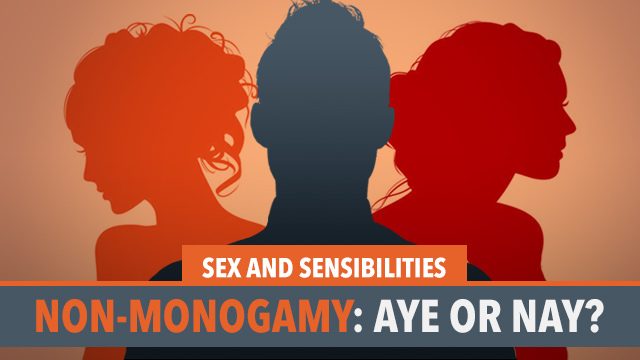SUMMARY
This is AI generated summarization, which may have errors. For context, always refer to the full article.

MANILA, Philippines — Ethical non-monogamy.
Does that sound like a paradox to you? Why or why not?
On the second episode of the Sex and Sensibilities podcast episode, Ana Santos talks about relationships, monogamy, and alternatives for couples.
Here’s what went down in this week’s episode:
Why is monogamy harder for some people?
This week’s topic was inspired by a talk about sex and relationships, Ana attended in New York last July 2014. The talk entitled, “Infidelity: The Truth About Love, Lust and Loyalty” featured syndicated sex columnist and author Dan Savage and clinical psychologist Esther Perel, clinical psychologist and relationships counselor, took a closer look at why it’s so much harder now to love, honor and stay with one person.
For one thing, people have much longer life spans now. That’s a lot of years to be married to one person and depend on one person for a variety of needs.
“Having one person to provide love, sexual pleasure, financial security, offspring, care, conversations, friendship, and the list goes on puts tremendous pressure on ‘The One’ and the relationship,” said Ana, citing some of the lessons Perel imparted during her talk.
She added, “People used to live much closer to one another and we used to depend on a variety of people for those needs.”
When is it ethical? When is it cheating?
It is cheating if the other person is unaware of it, says Ana. It is cheating if the other person is against it. It can be ethical if both parties decide on it, talk about it, and agree on being in a non-monogamous relationship. Rules and boundaries are not fixed; it will depend on each couple.
Our beef with PH infidelity laws
Under Philippine law, women may be accused of adultery for having sexual relations with a man that is not her husband. Men, however, may only be accused of concubinage under the same law.
While adultery may be substantiated with the presentation of circumstantial evidence against the woman, concubinage requires evidence to prove that a man is having sex with a woman who is not his wife under scandalous circumstances, that he is keeping the woman in the conjugal home, or that he is cohabiting with her in another dwelling.
In short, concubinage requires proof while adultery may be premised on circumstance. (READ: PH laws discriminating women)
And this is why Ana also worries that AshelyMadison.com a dating site for married couples, will not really work in the Philippines since it will put women in a compromising position. If we really want to level the playing field, we need to amend these archaic laws.
Ana points to the case of South Korea which decriminalized adultery this year. This, she says, recognizes changes in the way people are having relationships. She hopes the Philippine government can follow suit not to promote promiscuity or adultery, but to do away with laws that are unfair to women.
Happening right here!
Although the Philippines is predominantly Catholic, non-monogamy does happen here, albeit unethical. Just look at some of the country’s politicians and their many mistresses, Ana quips.
Is it for me?
If you’re against non-monogamy, then don’t do it. Even if your partner insists on it, if you’re not comfortable with it, then don’t agree with it. Ethical non-monogamy, however, is not a license to cheat or sleep around. To be in this kind of relationship, all parties involved must have a certain level of maturity, honesty, and responsibility. Ana calls this having “safe sex for the heart.”
Can we change this situation?
How does the concept of ethical non-monogamy impact the way we love and have relationships?
Let’s take this as a start of a new conversation where we recognize that the world and people are changing now and previous notions about relationships are changing with it. Ethical non-monogamy or “monogam-ish” (meaning kind of monogamous) as Dan Savage called it, is going to be another way people will choose to define their relationships. – Rappler.com
What are your own thoughts on non-monogamy? Whether you agree or not, let us know what you think. Email us at move.ph@rappler.com, share your anecdotes, tips, questions, and arguments. Speak up on #GenderIssues. You can also send us your ideas for our next podcast episodes.
Add a comment
How does this make you feel?
There are no comments yet. Add your comment to start the conversation.